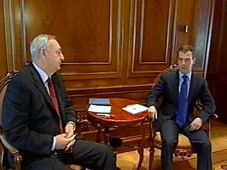Russian president meets Abkhaz separatist leader
By Mikheil Svanidze
Friday, June 27

The two leaders discussed the Georgian-Abkhazian conflict, agreeing that Russia has a place as mediator, according to the official Kremlin website.
“It was stressed during the meeting that any progress [toward conflict resolution] must be based on official documents, firstly the Moscow ceasefire agreement from 1994 and relevant resolutions from UN Security Council,” the Russian president’s office said in an online statement.
The 1994 Moscow agreement set up a Russian-led peacekeeping force to enforce the ceasefire in breakaway Abkhazia, which borders Russia to its north.
Georgia accuses Moscow of trying to wrest control of Abkhazia, and is seeking to replace Russia’s troops with an international force.
Signaling that separatist Abkhaz officials would continue to reject any move to replace the Russian troops, de facto Abkhaz president Sergey Bagapsh spoke of the Russian peacekeepers’ importance and thanked the Russian president for his social and economic support of the Abkhaz people, according to the Kremlin statement.
Georgian officials characterized the meeting as a “highly negative” affair.
Influential MP Nika Rurua told reporters the meeting “once and for all underscores the fact that Russia is not an impartial observer or, more than that, a peacekeeper [in Abkhazia].”
It was the first time since his election in March that Medvedev has met the de facto Abkhaz president. Bagapsh has previously met with now-Prime Minister Vladimir Putin, but typically did so with less publicity than yesterday, when both men posed together for news cameras.
A Russian Foreign Ministry official told reporters that Georgia’s heated reaction to the meeting was unwarranted.
“Given that senior officials from the US State Department, the EU and other international organizations have lately been in contact with Abkhazia’s leadership, the reaction from Tbilisi makes no sense,” the news agency ITAR-TASS quoted the unnamed official as saying.
Georgian officials say the presidential-level encounter between Medvedev and the head of a self-declared but unrecognized republic makes it clear Russia is not a neutral mediator.
“The meeting signifies that the annexation of Georgian territory is underway,” said MP Shota Malashkhia, the former chair of a parliamentary committee on Abkhazia issues. He added that a meeting between the Georgian and Russian presidents planned for later this summer would be pointless if Medvedev proves powerless to change the policies of his predecessor, Putin.
“The meeting will probably still happen, but if Medvedev keeps the same administration [as] Vladimir Putin, which he has no control of, the meeting will not be fruitful,” Malashkhia told the Messenger.
The Medvedev-Bagapsh meeting came a day after Georgian President Mikheil Saakashvili met with Germany Chancellor Angela Merkel in Berlin, where she said she shared Georgia’s worries about Russian actions in Abkhazia but urged restraint.
“We share the concerns about certain Russian steps that have been taken there. But we encourage Georgia to maintain the peace, because escalating the conflict is certainly not the solution,” Deutsche Presse-Agentur quoted Merkel as saying.
Later yesterday, Medvedev flew to Siberia’s Khanty-Mansiysk for the start of a Russia-EU summit intended to hash out a new strategic pact.
EU foreign policy chief Javier Solana said summit participants would bring up separatist conflicts where Russia plays a key role.
“In addition to EU-Russia relations, a number of international issues of common interest will also be discussed…[including] the situation in Georgia and Moldova,” Solana’s press office stated.
Tensions have climbed around breakaway Abkhazia since Russia announced in April it would formalize ties with the separatist authorities there. Moscow followed that decree by reinforcing its peacekeeping contingent in Abkhazia, and deploying military engineers to patch up the region’s dilapidated railroads.
Tbilisi is demanding the newly-deployed troops be withdrawn, and a reverse on the Kremlin decision to bolster links with the separatist administration. Russia says it is protecting the impoverished residents of the conflict zone.
